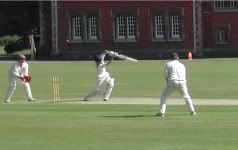Results, exams and hoops.
I find it insulting to the effort that I and my fellow students put in to get these results that these people claim that "standards are slipping" and that the exams are "too easy". Ladies and Gentlemen, they're not, and I challenge any one of those who claim that they are to sit them in the next exam season and get the top grade. People put real effort into these exams, and then they are told that they are worth nothing, that all that effort is pointless because they are "too easy". It's enough to make you not want to bother.
Now, that's not to say the exam system is perfect, it isn't. Not because it's too easy, but because it's too rigid. There are set criteria, things you have to write in order to get certain marks. Because of this, they mean that people can't show off, that they can't show how brilliant they really are because if they don't fulfil the criteria written on the examiner's mark scheme, it doesn't matter how clever or how brilliant they are.
What the education system is supposed to be about is education, instead it's about teaching people stock answers to standard questions. What we need an education system that educates people, that teaches them to think for themselves. What we have is an education system designed to make pupils jump through hoops.
And how did I do? 9A*s, 2As and an A in Additional Maths (the highest grade, as it's not actually a GCSE). And I'll be damned if anyone's going to tell me that GCSEs or any other exam is "too easy".






